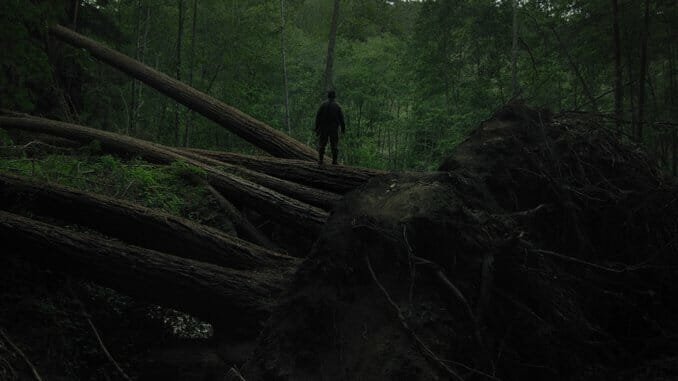Sator‘s Slow-Burn Is an Impressive, Gripping Indie Horror Achievement

There’s something in the forest. But at the same time, there’s nothing much at all. A man, a cabin and maybe—maybe—something more. Sator, a mumblecore horror somewhere between a modern-day The Witch, The Blair Witch Project and Lovecraft, is a striking second feature from Jordan Graham. It’s the kind of horror that trades jump scares for negative space, one that opens with imagery your typical A24 beast saves for its finale. Sator’s dedication to its own nuanced premise, location and tense pace make it the rare horror that’s so aesthetically well-realized you feel like you could crawl inside and live there—if it wasn’t so goddamn scary.
Sator is a name, an evocation, an entity. He’s first described, by Nani (the late June Peterson, excellent), as a guardian. Nani’s known Sator (whatever he may be) for a long time. The film represents shifts in time, and the physical transportation to places soaked in memories, with an aspect ratio change and a black-and-white palette. Nani’s lovely longhand script is practiced well from a lifetime of automatic writing, with the words—including some of the opening company credits, which is a great little joke—pouring from her pen and claiming a headwater not of this world. That same paranormal river flows to her grandson Adam (Gabriel Nicholson), that aforementioned man in the woods, whose relationship with the voices in his head is a bit less comfortable.
Nicholson leads the film with a gripping, near-silent performance as he goes about his day—checking his deer-cam for signs of life, exploring with his dog, always on the lookout for Sator’s approach—which makes the actual construction of the film so impressive. The tight trip melding the occult and the threats of one’s own mind is all due to Graham, who seems to have done effectively everything on the film: I’ve never seen a credits listing like his, which is about a paragraph long. You want to talk auteurism? Graham says analyze this. Writer/director/editor is one thing, but try “colorist,” “camera operator” and—for crying out loud—”cabin construction” on for size. This one-man-band means that everything feels of a piece and, for the most part, you can’t hear Graham struggling to heft all the instruments.
In fact, you hear exactly what he wants you to. There’s an undercurrent of constant voices on the soundtrack, played from recorded tapes of Adam’s mother (who heard voices in a much less amiable way than Nani) and erupting from the ether. The meticulous sound design, match-cutting on sound effects and using a particularly upsetting dog whistle as a delightfully smart callback, means that Graham was certainly thinking about his audio. That might not be initially apparent due to the dialogue-low mumble mix, which especially comes up with Adam’s alcoholic, Boomhauer-like brother, Pete (Michael Daniel). When we’re trying to figure out what the hell’s actually going on in the story, which is both supernatural and groundedly familial, catching every third word muddies already unclear waters and might cause you to crank your volume. While this choice eventually contributes to the overall tone of the film—confused, isolated, caught between competing sensory inputs—it comes at the early expense of our patience.
-

-

-

-

-

-

-

-

-

-

-

-

-

-

-

-

-

-

-

-

-

-

-

-

-

-

-

-

-

-

-

-

-

-

-

-

-

-

-

-








































